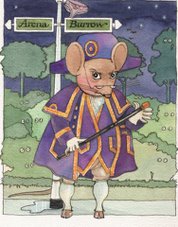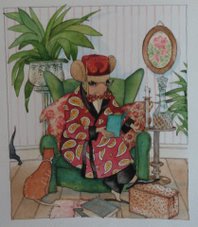Thursday, 30 November 2006
IT DRIVES ME CRACKERS
"As the crackling of thorns under a pot, so is the laughter of the fool", says the Bible [Ecclesiastes, 7.vi]. This jumps to my mind on the rare occasions when I bother to look at television these days. Almost every "comedy" programme is infested with an invisible studio audience whose raucous shrieks, titters and giggles of mirth distract and irritate the viewer - this one, anyway. The other day I happened to turn on in the middle of a repeat episode of "Keeping Up Appearances" in which that consummate character actress Patricia Routledge, in her persona of Hyacinth Bucket, was endeavouring to mount a horse. Her antics and facial contortions were extremely amusing, but they were ruined by the otiose hoots and bellows of the absent audience. As the sequence was shot on location in the country, I cannot see what possible rhyme or reason there was to dub these repellent sound effects on to it. Can anyone with an insight into the workings of the minds of TV producers - on the charitable assumption that they think coherently - please explain why they consider this practice is an embellishment of their programmes? Studio audiences who can be seen by the viewer, yes by all means. But the invisible ones crackling under the pot, no thank you. Away with them!
Subscribe to:
Post Comments (Atom)


3 comments:
While in Britain, and viewing an episode of a popular U.S. comedy show, I became aware that the canned laughter on the British version was much more over the top than on the original U.S. version.
The difference was striking.
Can it be in any way connected to the War on SAD?
I can't, I am constitutionally incapable, of finding 'the Bucket woman' even remotely amusing.
The laugh track is bad enough, but Routledge's gurning...
Anyway, I wonder if the reason for the laugh track is because directors and so on have not a great deal in the way of sense of humour and, creating the audience in their own image, assume wedon't either, so that we do have to be told when to laugh.
Or perhaps, in the case of many many sitcoms, the scripts themselves are so painfully unfunny that the offstage crew feel the need to signal the jokes.
I'll join you, Anticant, in saying "down with them!" I'm smart enough to distinguish between a joke and a non-joke. And I'm also smart enough to distinguish between funny and unfunny jokes. The vast majority of sitcom jokes fall into the latter category.
It does provide a useful cue for the actors though, so they don't carry on talking while the audience is laughing - assuming the studio audience and home audience are laughing at the same points, that is.
Post a Comment